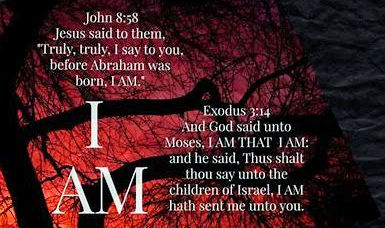
JESUS THE MAN AND THE SON OF GOD – THE CLAIMS OF JESUS CHRIST
Scripture: – Jesus is not part of God or one-third of God. Rather, he is fully God. “For in him all the fullness of Deity dwells in bodily form” – “Colossians 2:9”
Introduction: –
In this study I trust we will see clearly that the God who is being presented before us in it, is one, who has to put it in a modern idiom, “Made all the running”, He has “Taken the Initiative”. It is He that has both Spoken and Acted, and it is He that took the “First Steps”, in making Himself known to man.
“Only God can truly reveal God. This provided self-revelation, which is so necessary for salvation, has been given and provided through the Scriptures (The Bible). It’s from the same source we are given God’s view of mankind. The view provided is the true view, because after-all who can know mankind like his maker. In these days, countless false philosophies are misrepresenting the nature of mankind, it is therefore vitally important for eternities sake that we be grounded in the true representation. In doing so, we shall be better able to understand the doctrines of sin, judgement, and salvation, which are based upon the Biblical view of mankind’s nature”

In this study, we shall be looking at the Claims of Jesus Christ, but we must ask ourselves the question, Why? One of the most obvious reasons is that, it will enable us to know Him better.
More than this though it is in order that we might truly see that Jesus Christ is, the Son of God, and that He is Himself God manifest in the Flesh.
Christians claim that Jesus Christ was not simply God in a Human Disguise, or a man with Divine Qualities, but that He was in essence, God. The Bible teaches that Jesus is not merely someone who is a lot like God, or someone who has a very close walk with God. Rather, Jesus is the Most-High God himself. In “Titus 2:13” we read that as Christians we are “looking for the blessed hope and the appearing of the glory of our great God and Saviour, Christ Jesus.”
Christians believe, and rightly so that there was a perfect blending of both God and Man together and how is this seen?
- Jesus has two natures — He is God and man.
- Each nature is full and complete — He is fully God and fully man.
- Each nature remains distinct.
- Christ is only one Person.
- Things that are true of only one nature are nonetheless true of the Person of Christ.
- Chalcedonean Creed
This, however, is what Christians claim, and unfortunately there are times when Christians claim things about Jesus Christ, that He would not be able to agree with. Thus, we are going to look at what Jesus Christ actually claimed for Himself, and for the sake of clarity we will divide the claims of Jesus into four distinct areas.
- HIS SELF-CENTRED TEACHINGS
- HIS DIRECT CLAIMS
- HIS IN-DIRECT CLAIMS
- HIS DRAMATISED CLAIMS
each ofthe four areas will reveal to us further aspects of Jesus and who He was and indeed is.
- His Self-centred Teachings
One of the most striking aspects and features relating to the teachings of Jesus Christ, was that He was always talking about Himself. Yes! It’s true that on occasions He did speak of the Fatherhood of God, and also taught relating to the Kingdom of God, but He never failed to couple these teachings together with the fact that: –
- He Himself was the Son ofGod.
- He that had come From the Father to reveal the Father.
- He had come to usher in the Kingdom of God.
- The Kingdom was “His Kingdom”.
This self-centred teaching sets Jesus Christ immediately apart from all other religious teachers and leaders, for they were are self-effacing, as opposed to Jesus who in fact was self-advancing.
Religious teachers and leaders in general would say, “This is the Truth”, follow it”, whereas Jesus would say, “I am the Truth, follow me”, as an example of this the following Scriptures serve us and would be useful to understand, “John 6:35” – John 8:12 – John 11:25 & 26 – John 14:6 – Matthew 11:28 & 29”.
With such an opinion of Himself it is no wonder that He called people to follow him. Now was this mere Pride and Pomp? I would say no! Why? Because His Disciples who spent every day with Him and went through both the good and bad times with Him, all realised that He had the right to say and claim the things He said about Himself. It went so far that Paul, Peter, James, and Jude, each in their Epistles delighted to call themselves the “Slaves of Christ” because they recognised His deity.
- His Direct Claims

It’s very clear, that Jesus Christ believed Himself to be the long-awaited Messiah, and that it was He Himself that the Old Testament Scriptures had said would come – “Isaiah 53” being a typical one. It was He and His Kingdom that the Prophets had spoken of and would be established through Him.
However, over and above these things He believed Himself to be “The Son of God”.
- Does the Bible claim that Jesus possessed Deity as God in the flesh?
- Did He wear the names of Deity (God, First and Last, I Am, Jehovah)?
- Did He possess the characteristics of God (eternal existence, omnipotence, omniscience, omnipresence)?
- Did Jesus do Divine works (creation and ruling the Universe, redeeming, and judging mankind)?
- Did He accept worship, honour, and glory like God?
The answer to all of these questions is an emphatic Yes!
He made very clear and direct claims concerning this, and in two particular ways this is apparent.
- HE CLAIMED TITLES
- HE CLAIMED DEITY
- The Claims of Titles by Christ
One of the titles claimed by Jesus Christ was that of “The Son of Man”, which may not seem to extraordinary in our day and age, but when the claim was made some 2000 years ago, it was a recognised and accepted “Messianic Title”, which had come from Daniel’s Vision in “Daniel 7:13”. Another of the Titles Jesus claimed was, “The Son of God”, He said – “what about the one whom the Father set apart as his very own and sent into the world? Why then do you accuse me of blasphemy because I said, ‘I am God’s Son’?” – “John 10:36”, and this was said when challenged by the High Priest of the Jews.

The title is derived particularly from “Psalm 2:7” where it says, “I will proclaim the LORD’s decree: He said to me, “You are my son; today I have become your father.” Now of course if Christ believed Himself to be the Messiah, then one would naturally assume that the whole of His ministry would be coloured and reflect that sense of fulfilment, and indeed this truly was the case, we read in “Luke 10:23-24” – “Then he turned to his disciples and said privately, “Blessed are the eyes that see what you see. For I tell you that many prophets and kings wanted to see what you see but did not see it, and to hear what you hear but did not hear it.” NIV and the context of these verses also bears out the fact of His rightful claim to Messiahship.
- The Claims of Christ to Deity
Over and above the titles that Jesus claimed, He also claimed Deity. Perhaps it would be well for me at this point to explain the difference between Deity and Divinity.
“Deity is the Solid Object, the real thing we might say. God is Deity and Divine, but Divinity is that which is made or derived from God. Thus, although the World all around us, speaks of God, it in itself is not God, but only reflects or speaks of Him, thus it expresses Divinity”.
When this is considered in relationship to Jesus, we see that He never claimed Divinity, He only claimed Deity, but let’s see how and where He did so.
“Close association with God as His Father”.
In the first instance this is seen in the “Close association with God as His Father”. Jesus said in “John 10:27-33” – “My sheep hear My voice, and I know them, and they follow Me. And I give them eternal life, and they shall never perish; neither shall anyone snatch them out of My hand. My Father, who has given them to Me, is greater than all; and no one is able to snatch them out of My Father’s hand. I and My Father are one.” Then the Jews took up stones again to stone Him. Jesus answered them, “Many good works I have shown you from My Father. For which of those works do you stone Me?” The Jews answered Him, saying, “For a good work we do not stone You, but for blasphemy, and because You, being a Man, make Yourself God.” NIV.
Anyone even with a scanty knowledge of what the Gospels have to say, will remember that Jesus constantly spoke of God as His Father. As a Boy of Twelve, He astonished His Parents with the statement, “I must be about my Fathers business” – “And He said to them, “Why did you seek Me? Did you not know that I must be about My Father’s business?”, and then He made further statements such as those found in “John 5:17 – John 10:30 – John 14:10-11”, in all of these He makes it abundantly clear that He believed God to be His real Father.
Jesus also made many other startling claims, and I will simply enumerate some of them here now.
- To know Him was to know God – “John 8:19”
- To see Him was also to see God – “John 14:7”
- To believe in HIM was to believe in God – “John 12:45”
- To receive Him was to receive God – “John 14:9”
- To hate Him was to hate God – “John 12:44”
- To honour Him was to honour God – “John 14:1”
“I AM”, in relationship to Himself”
Jesus in the second instance used the name “I AM”, in relationship to Himself. In “John 8:51-59” and the
Jews wanted to stone Christ to death because He had used a holy name. It is seen again in “John 10:27-33” which was considered previously. It was considered to be the extreme of blasphemy for a man to claim to be God.

Ordinarily they would have been entirely in their rights to consider stoning because the Law of Moses required stoning for those that were blasphemous. Jesus claimed to have been around before Abraham – “John 8:56-59” – “Your father Abraham rejoiced that he would see My day, and he saw it and was glad.” Then the Jews said to Him, “You are not yet fifty years old, and You have seen Abraham?” Jesus said to them, “Truly, truly, I say to you, before Abraham was, I AM.” Then they picked up stones to throw at Him; but Jesus hid Himself and went out of the temple, going through the midst of them, and so passed by.” they didn’t like that either and objected to the numerous occasions when He did so.
No! it was the fact that He had taken the Divine name, “I AM”, to Himself, thus in doing so claiming to be God. It was this name was the name that God had revealed Himself to Moses with.
“Divine by inference”
In the third instance we see Jesus claiming to be Divine by inference and it is seen in “John 20:26-29” to and it is after Thomas had been requested by Jesus to put his Hand in His side etc, now what I want you to notice is that Jesus did not stop Thomas in his Worship of Him.
- His Indirect Claims
The indirect claims of Jesus as they are found in Scripture are just as abundant, clear, and forceful! as the Direct claims. The implications that are involved in what He did not say speak out just as loudly as what He actually said. On many occasions we see Jesus acting in a manner which only belongs in the domain of Gods actions and rights in what way did He do so? Let’s see just four of them.
- Jesus Claims to Forgive Sin
- Jesus Claims to Bestow Life
- Jesus Claims to Teach “Truth”
- Jesus Claims to be the Judge of the World

- Jesus Claim to Forgive Sins
On two separate and individual instances Jesus forgave sinners, and these are clearly documented for us in “Mark 2:1-12” and “Luke 7:36-50”.
In the first case it was the paralytic man who was brought to Christ by his friends and let down through the Roof. It’s a familiar story to many of us and I’m sure we remember this, and when Jesus saw him, in His Omniscience He recognised that this man’s problem was basically Spiritual and not Physical. So how did He deal with it? Well! to the surprise of the crowd Jesus said to him, “My son, your sins be forgiven you”.
In the second case it was when the immoral Woman came up behind Jesus whilst He was eating and washed His feet with her Tears and wiped them with her Hair. Jesus said to her, “Your sins are forgiven”.
On both of these occasions those around said, “Who can forgive sins but. God only” and they were right, and in the statements of Jesus we see Him indirectly claiming to be God.
- Jesus Claims to Bestow Life
In different places Jesus had described Himself to be: –

and in “John 15:1-1b” when Jesus is speaking of the Vine, He likens the life of the Disciples to their dependence upon Him, like Fruit on a Vine.
Jesus once challenged the Disciples regarding whether they would ever leave Him, and it was Peter who said in “John 6:68” – “Simon Peter answered, “Lord, who will we go to? You have the words of eternal life” – Holman Christian Study Bible – thus, showing the disciples belief.
Life is itself an enigma, and baffling as to its origin, and we can only call it a Divine Gift, a Gift Jesus claimed to provide.
- Jesus Claims to Teach the “Truth”
Now what calls this to our attention is not so much the actual truths He taught, but the Direct and dogmatic manner in which He taught them. This caused a deep impression on His contemporaries because they were dumb founded by His Wisdom. However, it was His Authority that impressed people the most.
We see this in “Luke 4:32” and “Matthew 7:28-29”. Now one might say, “well surely it was the same sort of authority as the Scribes or the Prophets” but it wasn’t. Why? because they always quoted their source of authority whereas Jesus claimed an authority of His own. His formula was not, “Thus saith the Lord”, but “Verily, I say to You”.
- Jesus Claims to be the Judge of the World
This is probably the most fantastic claim of all, but nevertheless in several of the Parables that Jesus taught with such authority, He emphatically implies that He will return at the end of this age, and there will be a time of final reckoning, when He Himself will rouse the dead from there sleep of death, both Righteous and Un-Righteous alike claiming that He will then Judge them. But, where in Scripture do, we see this, for it is Scripture that is of all importance, well let me enumerate a few of the portions.
- HIS JUDGEMENT – “John 5:22 – John 5:28-29”
- HIS TREATMENT – “Matthew 25:31-46”
- HIS REJECTION – “John 12:47-48”
- HIS DENIAL – “Matthew 10:32 & 33 – Matthew 7:23”
It is hard to understand the magnitude of such claims as these, but imagine for a moment a Church Leader saving, “Your eternal destiny is in my hands, I shall return one day at the end of time, and I will be your Judge”, such a Preacher would be laughed at but not Jesus.
- Christs Dramatised Claims
In the context of what we are considering today the Miracles of Christ from there Supernatural point of view, are not of the greatest importance, but from the Spiritual point of view they are, because they were truly “SIGNS”, as well as being “Wonders”.
Jesus never performed Miracles for the sake of it, and I might add, nor will He ever do so. The miracles He performed were never for selfish purposes, they were always enactments of Parables and John in his Gospel saw this and centered his Gospel around this fact.
The first of these being the Turning of Water into Wine, at a Wedding Reception in Cana of Galilee. What is the significance of this miracle, what is the “Sign” we are to see? Well! John tells us that the Waterpots of the story stood for “The Jewish rites of Purification” – “John 2:6”, and the Water in this instance speaks of the Old Religion of the Jews as “Jacobs Well” in “John 4”, and the Wine speaks of the New religion that Jesus was ushering in. When Jesus turned the Water into Wine, He was showing that the “New superseded the Old”, similarly the Feeding of the 5000, illustrates Christs claim to satisfy the Hungry Heart.

When Jesus opens the Eves of the blind man, He showed His words, “l AM the Light of the World” in “John 8:12”, to be true, and we could go on and on, but I believe that we see how Jesus dramatised His claims
Conclusion: –
Now one could say that these things are the inventions ofthe Writers of the New Testament, or they were the unconscious exaggerations of the wildly disturbed. However, these were the testimonies and writings of writers who both “Saw and Heard”, and they exemplify Jesus as Saviour.
What is one of the main reasons for this study? It is, written so that you may believe that Jesus is the Christ, the Son of God; and that believing you may have life in His name. The study is both apologetic, in that is to prove that Jesus is the Son of God, and the Messiah, the Saviour, the Redeemer. It is also evangelistic in its purpose so that belief in Jesus may be birthed and that in believing eternal life through His name may be provided.

So inspiring please you ican get Bible for church christiasa and also children Bible thanks so much
Im so glad that the teaching has been an encouragement to you and thank you for engaging in it. If you have not subscribed to our YouTube Channel please consider doing so at http://www.YouTube.com/c/AlbertMMartinWWCM